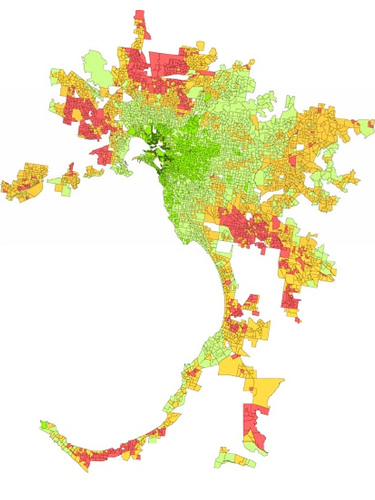The Eastern Transport Coalition is a council initiated advocacy group, covering Melbourne’s seven outer eastern Councils; Greater Dandenong, Knox, Manningham, Maroondah, Monash Whitehorse and the Shire of Yarra Ranges.
As part of its advocacy campaign, the Eastern Transport Coalition is holding a series of candidate forums, throughout each of the member councils. The evening was attended by representatives of each of the three major parties, the Australian Labor Party, the Victorian Liberal Party and the Victorian Greens.
I provided the introduction to tonight’s forum to highlight the current public transport deficiencies within Maroondah. The speech is available within this entry:
Welcome candidates and the community to the Maroondah City Council Eastern Transport Coalition Public Transport Forum.
Maroondah City Council, in the spirit of reconciliation, acknowledges that we are meeting on the land for which the Wurundjeri people have been custodians for many centuries, and on Land which the indigenous Australians have performed age old ceremonies.
We are fortunate tonight to have secured Mr Clay Lucas as our independent moderator. Clay may be well known to some of you as he is part of The Age’s city team having worked The Age and The Sunday Age since 2005 as a city reporter. This role sees Clay reporting on a range of topics across the transport sector, including roads, public transport, planning and development. In 2009 Clay won a Quill for transport reporting with Age investigative reporter Royce Millar.
Before I hand over to Clay to get the evening underway I just want to provide a quick overview of the public transport issues that Maroondah sees as important to the community and help set the context of public transport in the east.
Regional Perspective
The eastern region is an established area experiencing significant economic and population growth.
This growth is mainly occurring through infill and consolidation of existing residential, commercial and employment areas.
The network is struggling to keep up with demand and provide services that the community require to carry out their day to day activities as viable alternatives to the motor vehicle.
The Victorian Transport Plan – Does not deliver for the east
To keep pace with the population and economic growth the current public transport system needs to expand.
The Victorian Transport Plan does not adequately consider or respond to the needs of the East and greater investment is still required, if the eastern suburbs are to continue to be liveable and met the State’s land use and transport plans as outlined in Melbourne @ 5 million.
The high household car ownership in the City of Maroondah is evidence of the public transport systems inability to provide a service that allows our community to undertake their daily activities. The ETC and Maroondah City Council call on the government for the development of a long term regional public transport strategy for the Eastern region.
Ringwood Station Upgrade
Ringwood is identified as one of six Central Activity Districts which will offer CBD type services in suburban locations. In recent MTF public survey, Ringwood Station was voted as Melbourne’s second worse station, after Richmond.
The current Ringwood Station is difficult to access with steep ramps to station platforms that fail the State Government’s Disability Discrimination Act requirements.
The footpath access from each side of the station is not safe, particularly for people in wheel chairs and there is not direct wheel chair access to the car park which is located at the bottom of a steep stairway.
There has been no significant upgrade to the station in more than 50 years and it is desperately needing to be modernised.
For Ringwood Station to be truly accessible to all and permit convenient transferring between transport services, it is imperative that it is clean, comfortable, accessible and safe and secure.
Triplication for the Belgrave/Lilydale line
As Central Melbourne will continue to be a major location for employment, the arts, culture, sport and leisure, central Melbourne should be conveniently accessible by public transport for all Melbournians.
The demand on the Belgrave/Lilydale lines, with approximately 93,000 daily boardings, make these lines one of Melbourne’s most highly patronised rail corridors.
The patronage of both lines is reaching capacity with overcrowding a regular passenger experience. To facilitate more efficient and comfortable commuting for those passengers coming from beyond Ringwood Station, the triplication of the line between Box Hill and Ringwood is required.
Better Buses
Buses are the largest public transport option available to residents within Maroondah and the neighbouring municipalities. Bus patronage is growing, particularly on services with long operation and high frequency of service, i.e. the SmartBus Routes.
The recently conducted Metropolitan Bus Service Reviews was a step in the right direction with identifying inadequate service and generating regional specific solutions. However, very few of the recommendations have been implemented and they have only been small route extensions or minimal frequency and duration improvements.
Bus services in Maroondah remain poor with limited out of peak services and long wait times between services throughout most of the day. Improving bus services in coverage, service frequency and duration will provide real alternatives to the private vehicle and enable the community of Maroondah to have real choice in transport.
Conclusion
The provision of a more equitable, accessible public transport will reduce the detrimental effects of poor access to public transport in the eastern region, such as, social isolation, high car dependency, reduced financial freedom or the inability to access services.
A truly integrated and accessible transport network will also reduce the regions vulnerability to changes in the environment, such as climate change and peak oil.
I thank you for your attendance tonight and look forward to hearing how the candidates respond to your issues.
I’ll now hand you over to Clay to get the evening underway.
